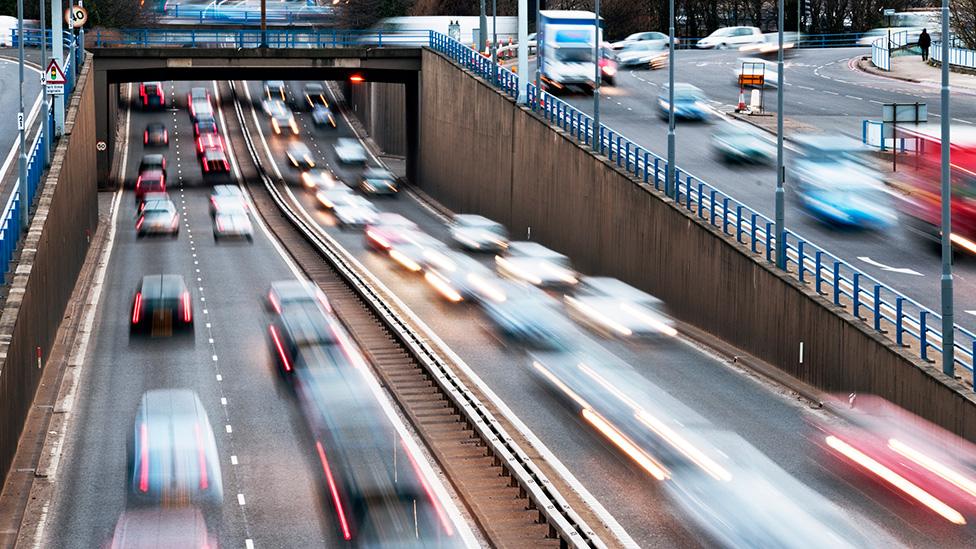Climate change: Switch road cash to broadband, adviser says
- Published

The UK government has plans for a number of new road schemes
The UK government’s climate change adviser is urging ministers to reconsider plans for road-building and switch the investment into broadband.
The government plans £28bn worth of new roads to relieve congestion.
But the head of the Climate Change Committee, says it could be cheaper, better for the economy, and climate-friendly to expand fibre optics.
That's because the government’s plans for road-building assume 1% growth a year in demand for travel.
But Chris Stark says Covid-19 has taught many people they can work from home thanks to the miracle of video conferencing.
The head of the AA recently told BBC News he thought people would never fully return to their previous travel habits, and forecast that transport demand would shrink, not grow.
Mr Stark agrees. He believes productivity and the economy would benefit if the roads fund was re-directed from tarmac to fibre optics.
Virus will transform UK work and travel, says AA
'New normal'
He told BBC News: “The government mustn’t be investing in anything likely to increase carbon emissions. I expect that video conferencing will become the new normal, and we won’t return to travelling the way we did.
“I would spend the roads budget on fibre. You would get a huge return to the economy with people having better connections.
“You would save people’s time and increase their productivity.”

Mr Stark said Covid-19 had taught people they can work from home thanks to video conferencing.
Mr Stark said his committee had taken advice from a psychologist over the public’s readiness to accept major changes in their lives.
The message was that the longer the change lasts, the more it becomes the new normal.
“At first, people are resistant to the changes,” he said. “But then they get used to the new situation, they see the benefits, and they can be reluctant to change back again because they see the drawbacks of the way things were.
“A lot of people will say ‘I don’t want to do that much travelling in the future’.” He said the longer the duration of the change, the more “sticky” the change would become.
'Shovel-ready'
He said other elements of government infrastructure spending would help the UK out of the Covid-19 crisis. They included “shovel-ready” projects such as electric vehicle charging infrastructure, and energy projects including onshore wind.
The big challenge, he said, was to insulate the UK’s draughty homes – a pledge that was made in the Conservative manifesto, but wasn’t mentioned in the latest infrastructure announcement. , external
He said the labour-intensive process of renovating homes would also provide an essential source of jobs as the UK shifts towards a zero-carbon economy.
“The transition is going to be very challenging for the oil and gas industries – and we need to make sure people are protected, otherwise support for climate change policies will evaporate.”
But Mr Stark warned the government to avoid the temptation to offer unconditional bailouts to fossil fuel firms struggling with the recession and the low oil price.
“If we were in the world of bailouts, then one thing to consider now is what strings might be attached to bailout packages. For dirty industry there might be (environmental) strings. That could be a key condition for the aviation sector, for instance,” the CCC chief said.
He said the low oil price could allow the government the political space to put up fuel taxes. He said he hoped that the Covid-19 crisis had taught governments and industries of the need to put an appropriate price on future risks when they were doing financial planning.
“The transition over Covid-19 has been disorderly,” Mr Stark said. “The climate change transition needs to be smooth.”
A Treasury spokesperson said: "Roads are crucial for connecting people, places and businesses, with freight logistics businesses depending on the road network working effectively to get goods in the right places.
"But we recognise that broadband is also crucial, and that is why at Budget we set out a record commitment of £5bn to support the rollout of gigabit-capable broadband. Obviously we are focused on limiting the short-term health and economic effects of coronavirus, but we are still committed to delivering on our climate change targets."
Follow Roger on Twitter., external